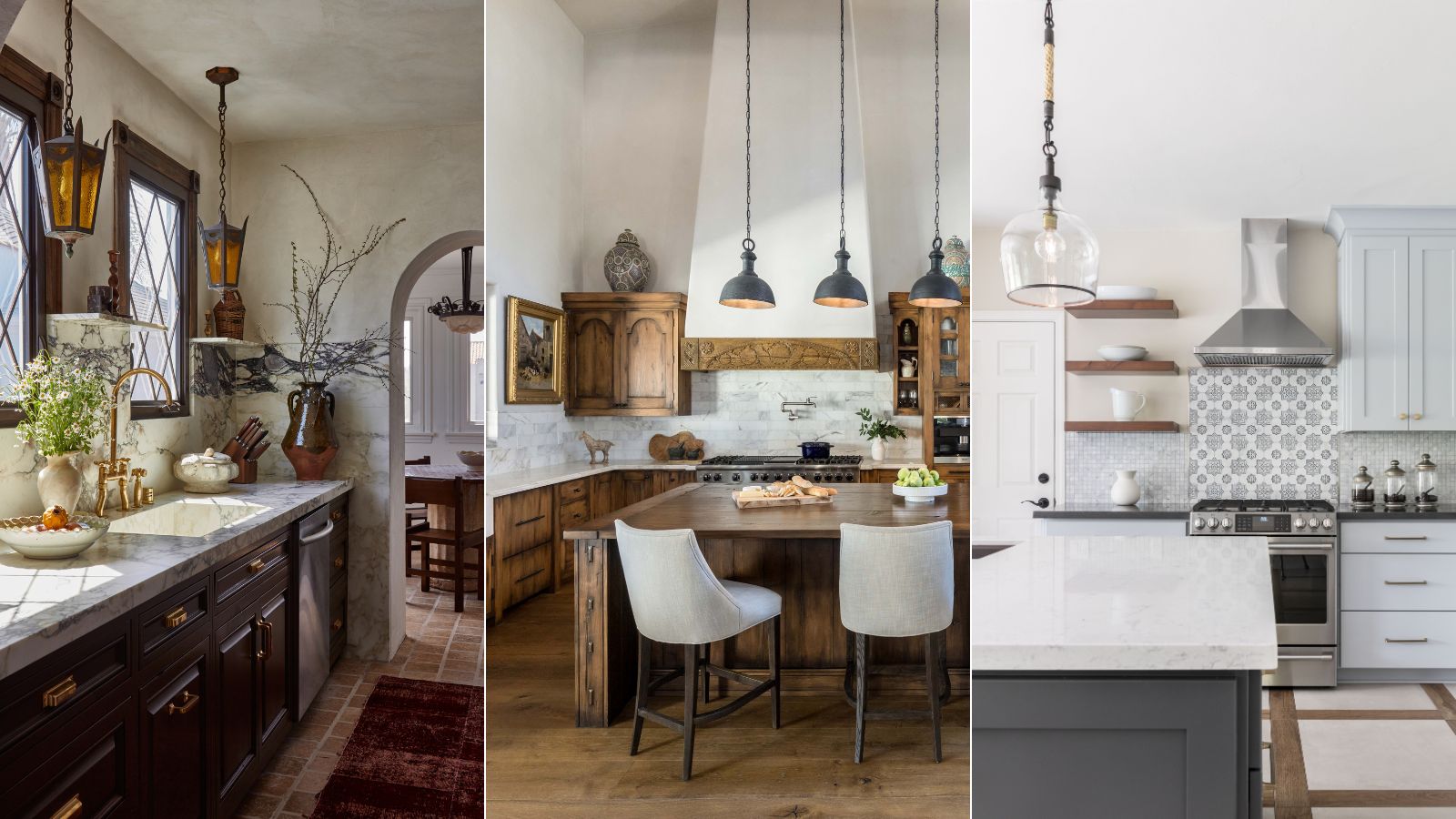
Spanish style kitchens most likely conjure images of warm spaces filled with natural materials, stone tiles, iron accents, and ample charm – and you'd be right. But with varying styles of Spanish interior design, you can really find an aesthetic that works with your personal tastes.
This European kitchen design style is one of the most popular in the United States thanks to the Spanish architecture you can find all over the country. From the earthy color palettes to the natural stone finishes and dark metal accents, there are plenty of inspiring ways to introduce Spanish style to your kitchen.
From traditional terracotta floors and wooden cabinetry to dark metal fixtures and earthy hues, these Spanish style kitchens showcase every design element core to this style – there's something here for every space.
What characterizes a Spanish kitchen?
Spanish kitchens can take on varying aesthetics depending on their style – Spanish revival kitchens will differ slightly from Spanish Colonial or traditional Spanish schemes.
That said, these variations have a few key elements that remain the same. At its core, Spanish kitchens should feel warm, welcoming, and above all, lived in. Countertops are never clear, and pots, pans, and decor have age and wear.
Spanish kitchens have a sense of tradition about them. Terracotta tiles are ever present, especially as flooring and even backsplash features – they are still handmade by artisans in Spain, but reclaimed options are also available.
Alongside terracotta tiles, wrought iron finishes are also heavily featured in Spanish kitchens. From kitchen cabinet handles and drawer pulls to aged chandeliers and pendant lights, introducing iron finishes in these areas will add the depth and interest Spanish kitchens are renowned for, and they contrast beautifully with the more neutral color palette typically used.
What color schemes work best in a Spanish kitchen?
There is often a misconception that Spanish kitchens are dark, but these spaces favor neutral hues. Warm white tones are usually used on the walls – a lime wash or plaster finish is not uncommon – to work in harmony with the wooden cabinetry that is often introduced.
Alongside neutral colors, earth tones are also quite typical of Spanish kitchens. Think terracotta, browns, rusty reds, and even shades of orange. These colors bring the outside in and offer a nod to the Mediterranean style that infuses many European kitchen designs.
5 charming Spanish style kitchen ideas to try
Whether you're designing a kitchen for an authentic Spanish home or simply want to infuse elements of the style into your scheme, these tips, tricks, and ideas from interior designers will help you make the right design choices.
1. Choose natural wood cabinetry
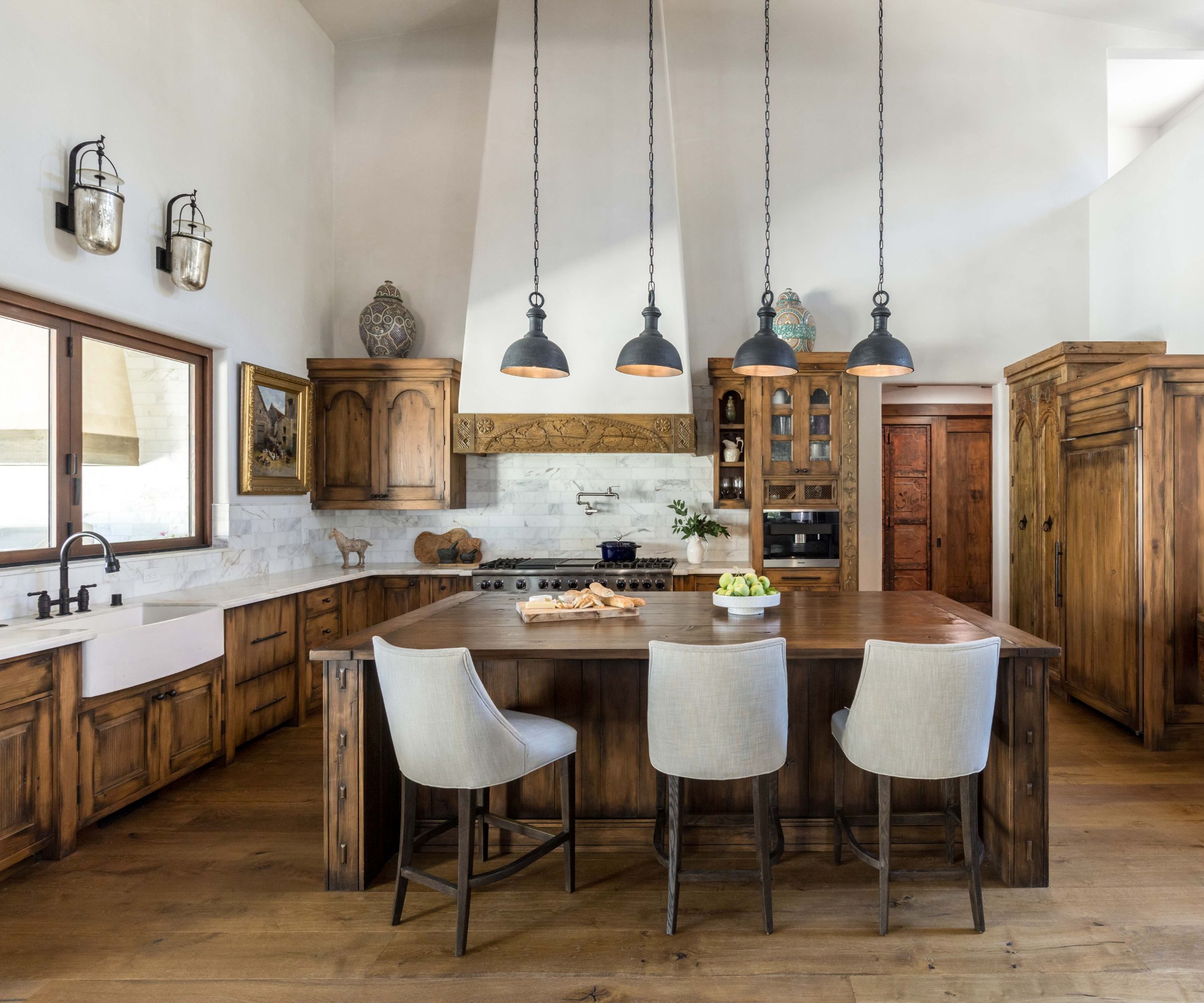
Kitchen cabinetry covers a huge amount of any kitchen, so ensuring you choose the right material and finish is important when introducing Spanish style. While some interior design trends call for bright, saturated colors, Spanish style kitchens are quite the opposite.
'A Spanish-style kitchen is characterized by its warm and inviting atmosphere, with a focus on natural materials and earthy tones. Wooden kitchen cabinets feel authentic and original, as well as timeless. They provide just the right amount of rustic that a traditional Spanish kitchen exemplifies,' says Kristen Fiore, of Kristen Elizabeth Design.
'In my own kitchen design projects, I have introduced Spanish style through the use of hand-painted tiles, wood accents and cabinetry, and iron fixtures. Color is introduced in ceramics just as you see it throughout Spain and Portugal,' she adds.
2. Add a statement countertop
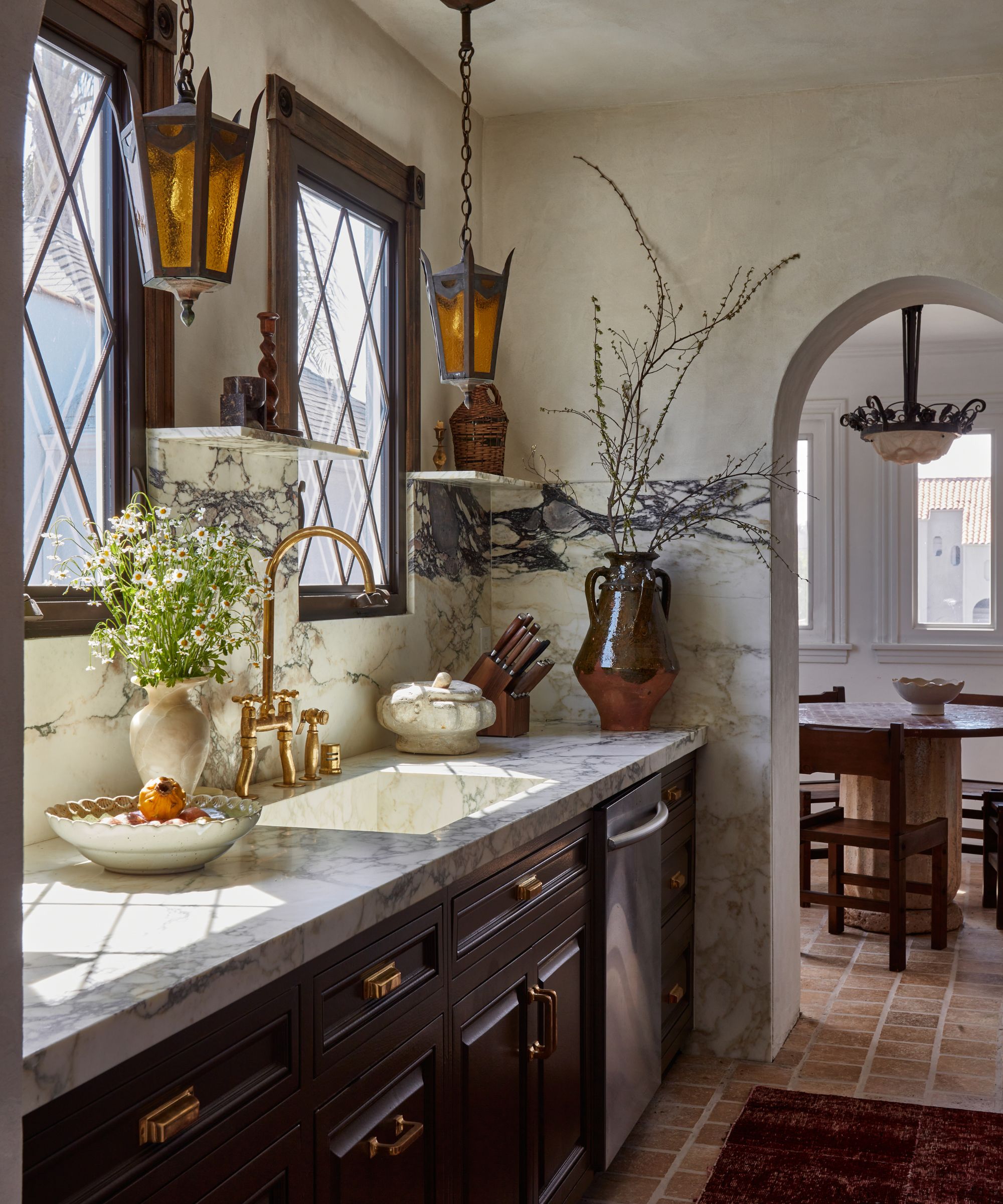
While there are a number of different Spanish style kitchens, there seems to be a particular resurgence of the Spanish revival trend, especially in and around Los Angeles. Many of homes in this style are in need of a reinjection of original character.
'When I purchased my 1920's Spanish revival home, the first space I wanted to restore was the kitchen, which had been completely gutted and lacked any of the original charm and character of the home. I loved the creativity this space offered,' says Drew Michael Scott, of Lone Fox.
'I knew I wanted the countertops to make a statement and spent a lot of time browsing stone yards until I found this gorgeous Calacatta Monet slab with its really interesting grain pattern, and that really helped set the tone for the rest of the kitchen,' he explains.
'The cabinets were brand new so I decided to keep them and paint them Benjamin Moore's Van Buren Brown, and I plastered the walls and ceiling to have that stone-like finish. The Cle pantry paver floor tiles really tie it all together, and I laid them in a traditional offset brick pattern with piped-in grouting to give a "hand done look", Drew adds.
3. Introduce color and pattern with tiles
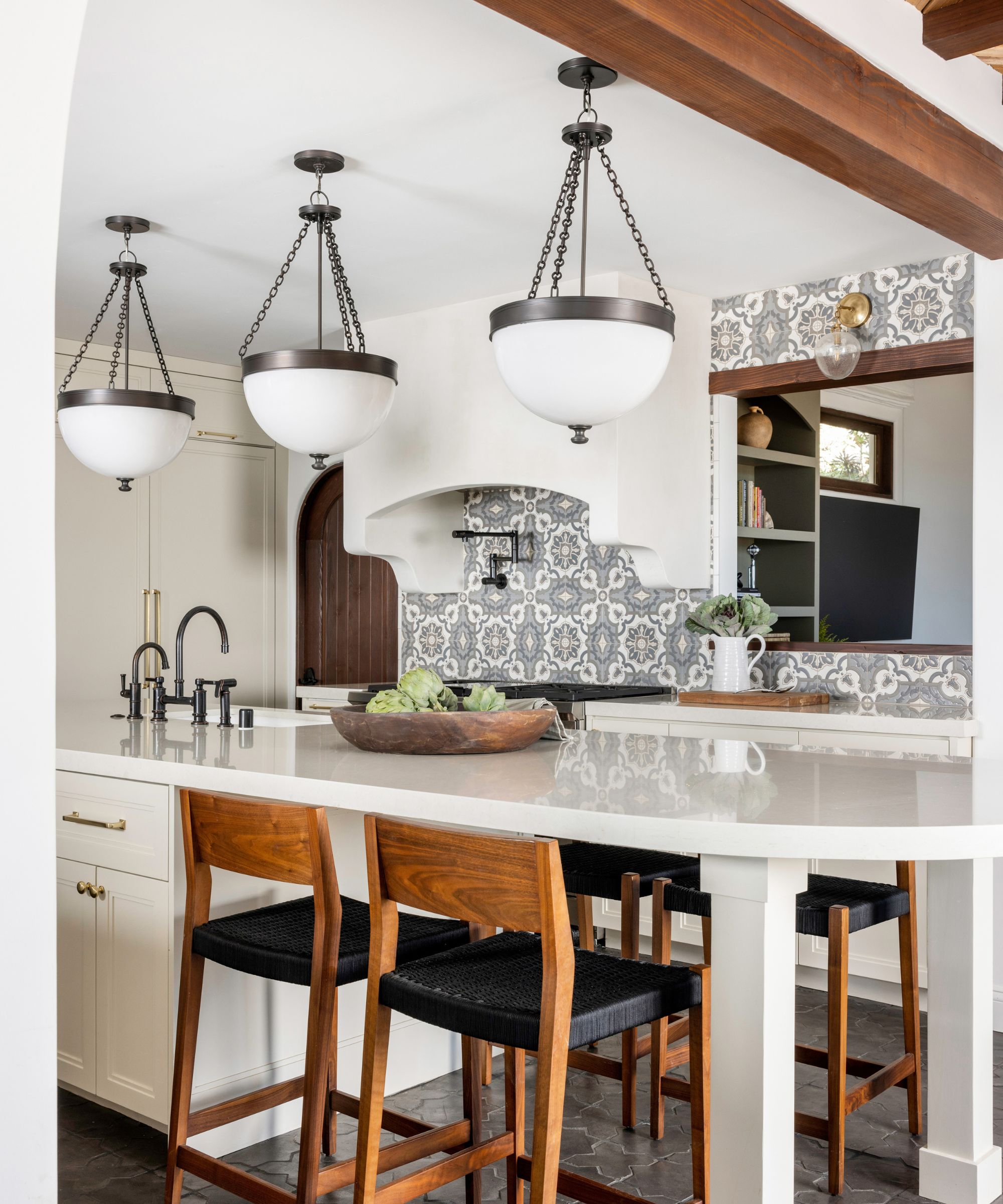
Spanish style kitchens might be predominantly earthy hues and natural materials, but there is still space for a more colorful interpretation. Traditional Spanish kitchens would introduce color through decor, something that can be introduced to any kitchen scheme.
'Spanish kitchens are the heart of the home and enjoy lively family gatherings and conversation. Brightly colored kitchen tiles, textiles, and ceramics add a cheerful and vibrant touch,' explains Kristen.
Tiles are a key feature in Spanish style kitchens, from slate and terracotta floor tiles to patterned encaustic tiles used on the walls. In this kitchen, the grey-toned wall tiles add interest and personality to the kitchen without overwhelming the space.
'The overall atmosphere of a Spanish-style kitchen is one of comfort and relaxation, with a strong sense of place,' adds Kristen, so ensure you maintain the atmosphere Spanish style kitchens evoke when introducing decorative elements.
4. Create texture with plaster walls
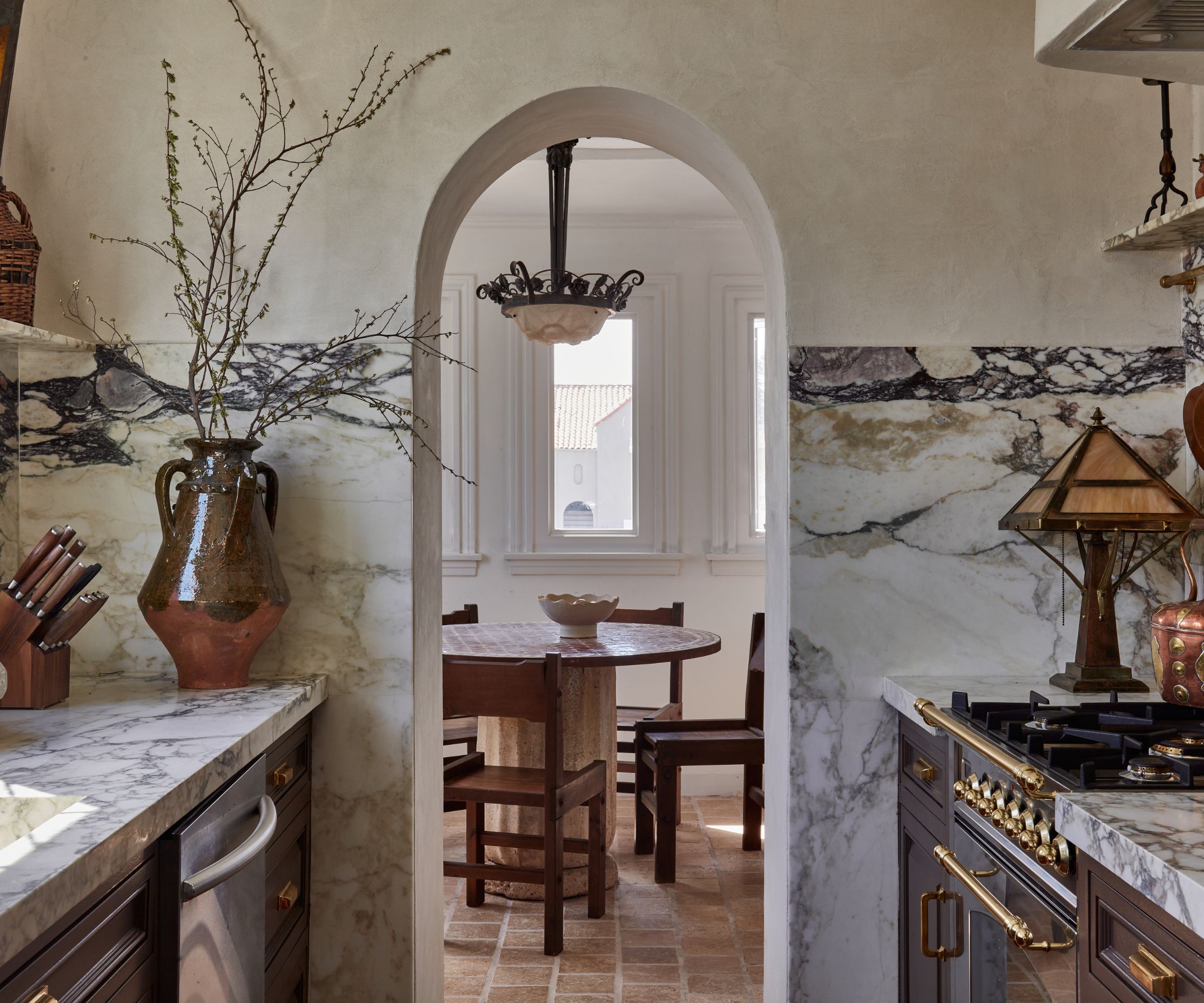
A Spanish style kitchen feels truly authentic when a mix of old and new is introduced. Reclaimed materials are a great place to start – this could be tiles, wood, or even decor.
'To introduce Spanish style into a kitchen space consider earthy materials and traditional design elements such as terracotta tiles, reclaimed timber and textured plaster walls,' suggests interior designer Kate Nixon.
Pair these older elements with more decorative details, which naturally works really well in a kitchen. Consider the hardware you choose, and how it works with your light fixtures. 'Decorative ceiling beams, a statement rangehood, iron pendant lights, and joinery hardware evoke the spirit of Mediterranean hospitality,' Kate adds.
5. Opt for wrought iron accents
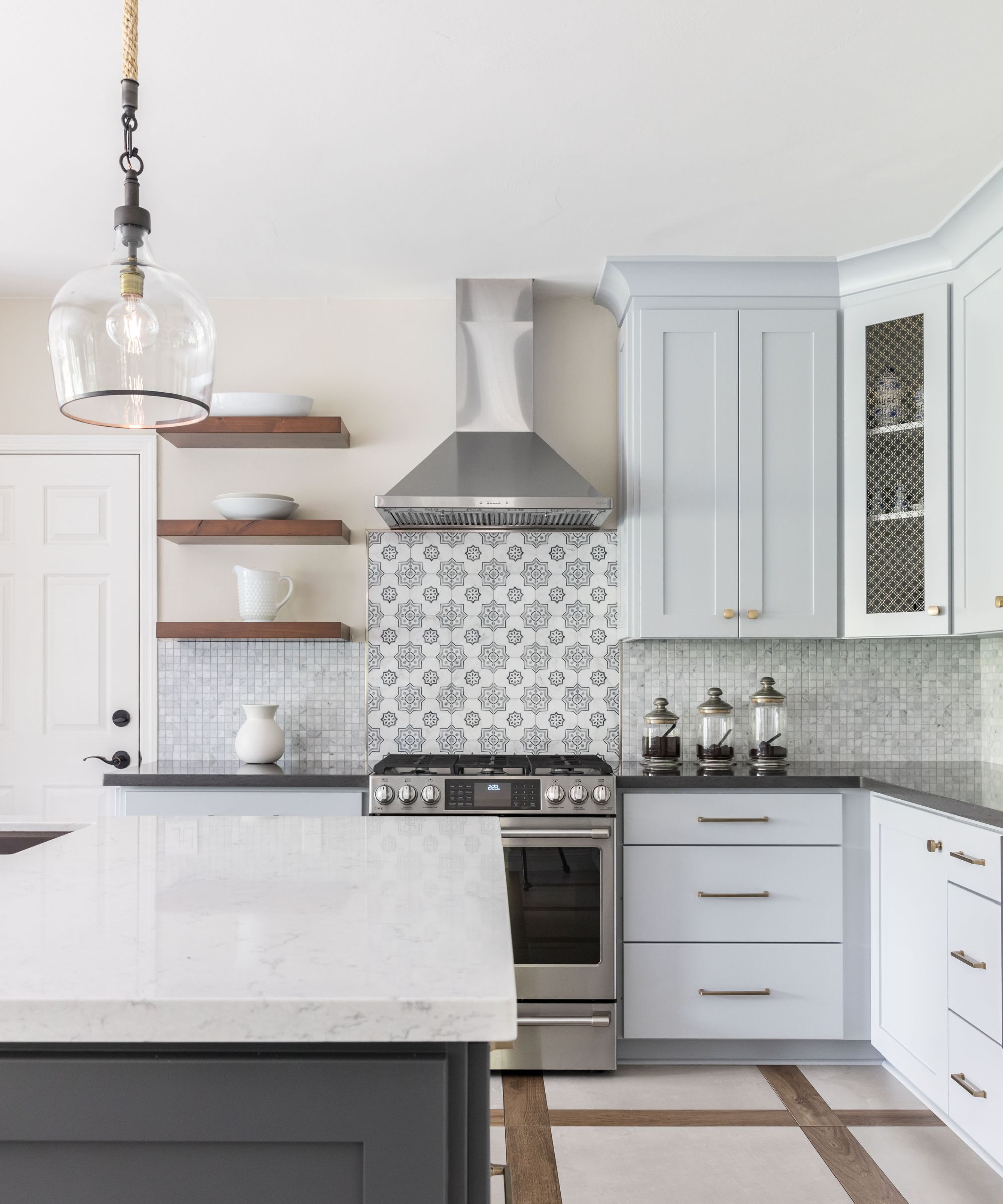
Any kitchen design requires the right style and finish of hardware to create a scheme that feels authentic. In a Spanish style kitchen, wrought iron hardware is a must-have, especially if you're working with a space that doesn't feel overtly Spanish.
'Wrought iron lighting fixtures, cabinet hardware, and other accents repeat the rustic and natural materials and aesthetic,' says Kristen. In this kitchen, wrought iron drawer pulls have been introduced on the lower cabinets, and wrought iron details can be seen on the pendant lights.
Although these may seem like subtle details, and they aren't the detail that immediately catches your eye, they are a key design element in Spanish style kitchens. If you simply replace them with gold or chrome, the scheme will immediately lose its European influence.
Spanish style kitchens rely on a warm, inviting atmosphere, natural materials, and finessed details. Keep the color palette to warm neutrals and earth tones, and make sure any metal accents are made from wrought iron for an authentic scheme. Spanish style kitchens are characterful, charming, and unfussy, so keep this in mind when adding Spanish influences to your scheme.







